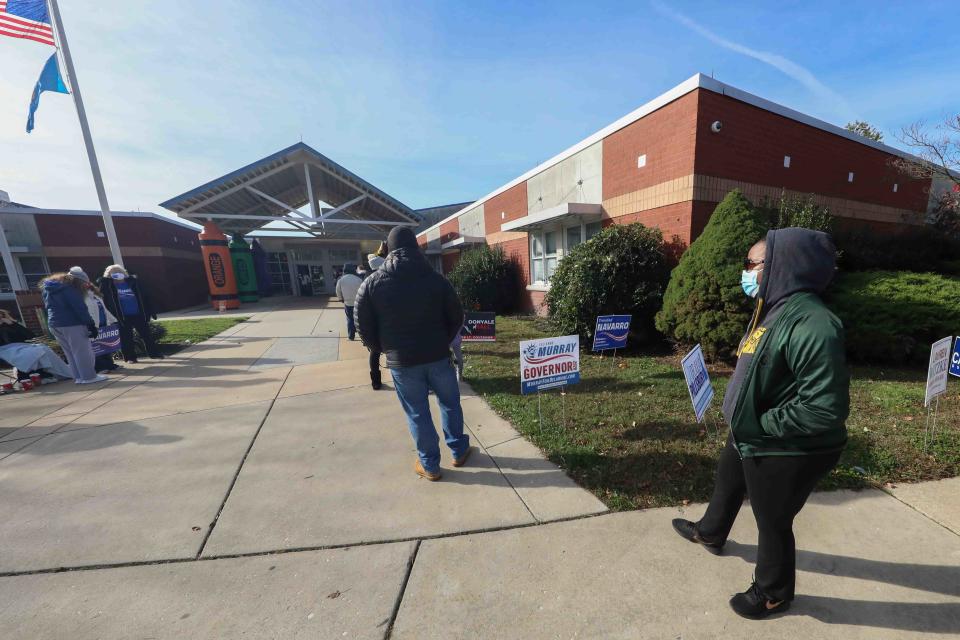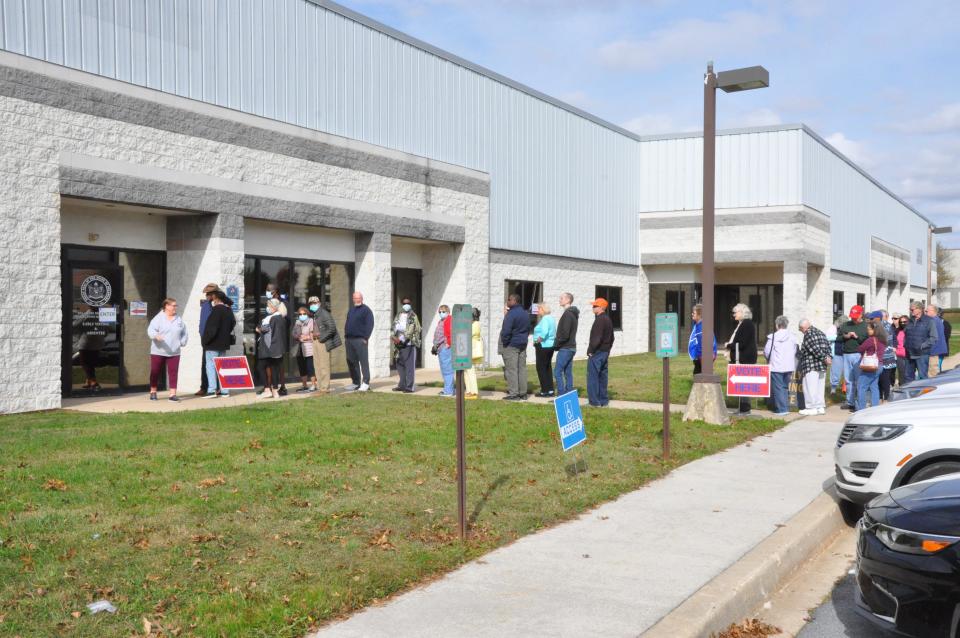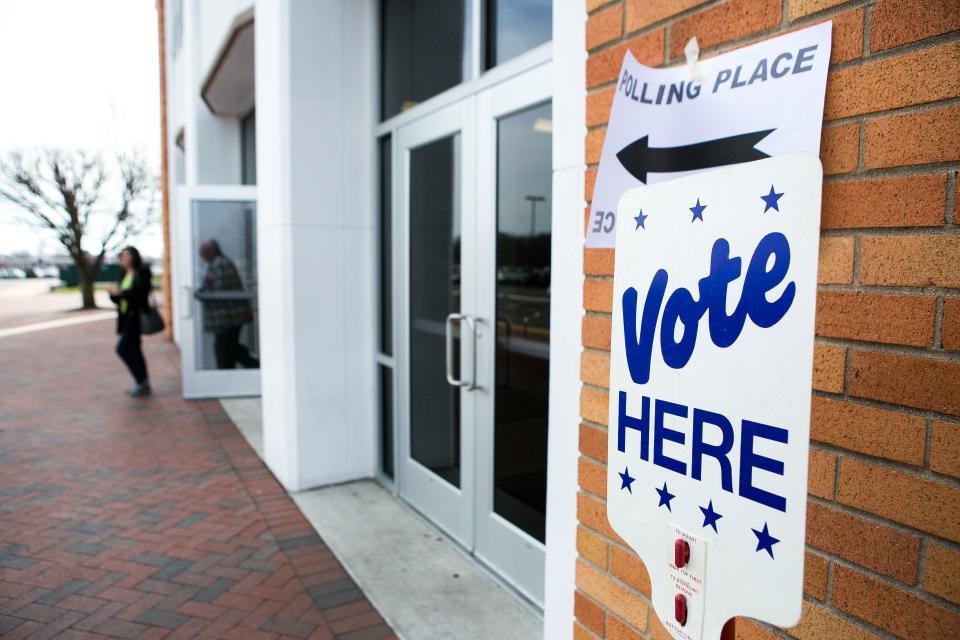Delaware lawmakers consider options after court tosses out early voting, mail-in ballots
Delaware officials will consider at least one proposed constitutional amendment filed in response to recent court decisions striking down efforts to expand early voting and vote by mail.
A Friday ruling in Delaware's Superior Court was the latest in a series of court decisions striking down Democrats' efforts to expand voting access in the First State.
The latest ruling struck down Delaware's new voting law changes that allow individuals to visit a polling place and cast ballots days ahead of election day. It also ruled unconstitutional a longstanding practice that allowed state residents who are disabled, who may be on military duty or have some other reason to be outside of Delaware to register as a permanent absentee voter.
There are questions about the practical applications of the ruling and Delaware lawmakers said they are working on legislation that would both modernize the state's restrictive voting options and do so in a way that will cure the legal snags that courts have cited in striking down those changes.
How we got here?
For years, Delaware's voting laws were relatively restrictive compared with other states, particularly for a state with a strong Democratic majority.
There has been a push to change that in recent years. In 2019, the General Assembly passed a law allowing state officials to open up numerous polling places 10 days before Election Day to allow people to vote early in person. The change took effect in 2022. All but four states offer such voting options.
Then, the pandemic spurred further changes.

In 2020, Delaware temporarily expanded voting access by allowing registered voters to mail in ballots. This was a departure from Delaware’s absentee system, in which voters needed to provide an excuse to vote by mail.
Then, in 2022, lawmakers passed legislation authorizing anyone to vote by mail without an excuse. They also passed legislation allowing individuals to register to vote up to Election Day. Some 28% of Delawareans cast an early ballot that year, according to officials.
The other rule targeted by the recent court decision, allowing people to permanently register as absentee voters was passed in 2010. That law allowed qualifying individuals to permanently register as absentee and have their ballot sent to them rather than file absentee paperwork each cycle.
Voting reform laws fail constitutional test
While there is a hot political debate over voting reforms, Delaware courts have struck down those rule changes based on non-political provisions within Delaware's constitution, which sets out some specifics about how elections are to be administered.
When Delaware lawmakers enacted the reforms in question, they simply amended Delaware's laws, which are superseded by the state's constitution.
After the General Assembly passed those law changes, plaintiffs backed by local Republicans went to court challenging them on grounds that the law changes violated provisions of the Delaware Constitution, lawsuits that have been successful to this point.
In 2022, the Delaware Supreme Court affirmed a lower court ruling that struck down changes that allowed any registered voter to vote by mail without an excuse as well as the law change that allowed for same-day voter registration.
2022 ruling: Delaware Supreme Court finds vote by mail, same-day registration unconstitutional
The justices wrote that both changes conflict with provisions of the constitution that govern voter registration as well as who qualifies for absentee voting.
Now, on Friday, a second lawsuit aimed at allowing in-person voting days before the election as well as absentee voters to permanently register as absentee was struck down by Sussex County Superior Court Judge Mark Conner.
Similar to the 2022 finding by the Supreme Court, Connor wrote that the laws allowing early voting provisions and permanent absentee registration violate portions of the state constitution that dictate the day elections are held and who qualifies for voting by mail.
Debate over voter reform
Those in favor of these changes say making voting easier will allow for more people to become involved in the process.
They argue that many people are not able to take off work or otherwise balance their life commitments within a strict regime that relies primarily on showing up on the day of the election and waiting in line to cast a ballot.

“Restricting early and permanent absentee voting will directly impact the ability of parents, low-income workers, shift workers, those with disabilities, and the elderly, to have their voices heard as personal schedules and needs don't always align with the state's predetermined voting day," House Speaker Valerie Longhurst, House Majority Leader Melissa Minor Brown and House Majority Whip Kerri Evelyn Harris wrote responding to the recent ruling.
Those against such changes, primarily Republicans, cite concerns about the potential for voter fraud under expanded voting systems although states that have enacted such reforms have not seen widespread voter fraud.
Easier to vote: Changes in voting laws expected to boost turnout in Delaware
The pushback against voting access gained further fire when former President Donald Trump sought to discredit President Joe Biden's 2020 election by raising unfounded concerns over widespread voter fraud.
Republican leaders in the Delaware General Assembly issued a statement Monday emphasizing that their opposition to recent law changes was similar to the courts: strictly legal.
"To be clear, we take no issue with in-person early voting. It is a convenience that many Delawareans have embraced and has been accepted by voters nationwide," wrote Republican state Sens. Gerald Hocker and Brian Pettyjohn as well as state Reps. Mike Ramone and Lyndon Yearick responding to the ruling.
What's next
The Friday ruling was handed down by a Sussex County Superior Court Judge, meaning attorneys in the office of Attorney General Kathy Jennings, the office that defended the law changes in court, could appeal the ruling to the Supreme Court. It's unclear if they will take that effort given the 2022 Supreme Court decision that curtailed the other voting rights expansions on constitutional grounds.
On Monday, representatives for Jennings' office declined to comment beyond noting: “For five years, this office has fought like hell to protect voting rights. We’re not stopping now.” Jennings has scheduled a press conference for Tuesday to issue further comment.
UPDATE: Delaware attorney general to appeal recent ruling striking down early voting
The practical implications for the coming election season are also unclear. Officials in the Delaware Department of Elections said they are still reviewing the recent decision and declined comment. They said that they would provide information about changes to the voting process based on the decision as soon as possible.

It is possible this election season will be the most restricted in recent years, requiring people who vote in person to show up the day of the election and those who seek to vote by mail to register their excuse for doing so with election officials long before Election Day.
It's also possible that there could be different rules for primary voting day versus the general election.
Former State Attorney General and retired Superior Court Judge Jane Brady, who represented those challenging the early voting and permanent absentee registration laws, noted that the language of the constitution applies only to November's general election, not special or primary elections.
Brady's statement characterized that as "unfortunate" and emphasized that her opposition to expanded voting rights centered on how the changes violated the state's constitution, not the principle of the changes.
Changing Delaware's constitution
Democrats in the Delaware General Assembly will again try to implement the same reforms, and this time by amending the state's constitution. It is an effort that requires some Republican buy-in. Republican leadership also said Monday they also intend to propose their own constitutional amendment.
Last year, the Delaware Senate voted on one constitutional amendment that would clear the way for any registered voter to vote by mail. The measure was passed by the Senate in May but wasn't taken up by the House of Representatives last year or thus far this year.
To pass a constitutional amendment, the General Assembly needs to pass the bill in two consecutive legislative sessions. So if the current proposal passes this year, it will need another vote in the future.
It's not the first time Democrats have sought to amend the state's constitution to expand vote by mail.
In 2019, Democrats had the support of 12 of the 15 Republican representatives in the Delaware House, passing a constitutional amendment that would expand voting by mail.
Previous effort: Republicans block bill to allow no-excuse absentee voting in Delaware. What's next?
The second leg of the constitutional amendment came after Trump's efforts to delegitimize the country's election systems. No Republicans in the state's House of Representatives supported the legislation on its second round and it failed to pass in 2021.
In a written statement, the Senate's Democratic leadership said while the court rulings hinge on the wording of the Constitution, they singled out Republican lawmakers as obstructionists in blocking previous efforts to amend the Constitution.
The statement, signed by Senate President Pro Tempore Dave Sokola, Senate Majority Leader Bryan Townsend, and Senate Majority Whip Elizabeth “Tizzy” Lockman, specifically took aim at Ramone, the House's Republican Minority Leader, and Rep. Mike Smith, stating they both changed their vote on the previous constitutional amendment effort after "President Trump began peddling the Big Lie of a stolen election in 2020."
In addition to passage over two years, constitutional amendments also require a two-thirds vote. Democrats have that on their own in the Senate, but in the House need the support of at least two Republicans.
Meanwhile, Ramone and other Republican leaders emphasized their gripe with early voting was with how it became law and not its substance.
In a written statement, Republican leadership said they are working on their own constitutional amendment "to correctly implement the form of early voting that Delawareans used in the last election cycle, taking care to address the court’s objections."
Townsend, the Democrat's senate majority leader, said Democrats may propose further constitutional amendments to address the courts' decisions, but that will depend on the potential of appealing the most recent court decision, how far the current proposed constitutional amendment will go to address the legal issues and also what kind of support lawmakers can build.
Contact Xerxes Wilson at (302) 324-2787 or xwilson@delawareonline.com. Follow @Ber_Xerxes on Twitter.
This article originally appeared on Delaware News Journal: Delaware lawmakers to take up voting rights again after court ruling

